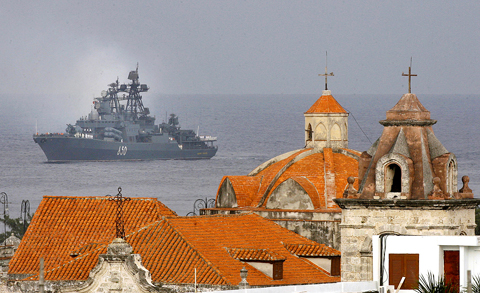A Russian anti-submarine destroyer and two logistical warships docked in Cuba on Friday, a thumb-your-nose port call aimed at Washington in waters just 145km from Florida.
The arrival extends a tour that included stops in Venezuela and Panama and shows Moscow’s desire to flex some muscle in the US’ backyard. It comes even as Cuban President Raul Castro reaches out to the US, offering to negotiate directly with US president-elect Barack Obama and proposing an unprecedented swap of political prisoners.
“That is Cuba’s diplomatic specialty, playing both sides, or all sides, on every issue,” said Daniel Erikson, director of Caribbean programs at the Inter-American Dialogue, a Washington think tank.

PHOTO: AP
Russian sailors in white and tan dress uniforms stood at attention on the deck of the Admiral Chabanenko destroyer, which chugged into Havana Bay amid a cloud of gray smoke. The ships will be moored until Tuesday and the crew planned a tour of Havana that includes a trip to a Cuban naval school.
A ceremonial Cuban cannon fired a 21-blast salute that rattled the windows of nearby buildings, and a naval band waiting on a cruise ship dock played the Russian and Cuban national anthems. A hulking barge that frequently ferries US food to the island happened to be waiting in the area but had to move to make room for the Russian warships. It was unclear whether it had any US cargo aboard.
Washington’s nearly 50-year-old trade embargo prohibits US tourists from visiting Cuba, but the US has allowed cash-only sales of its agricultural products to the island since 2000 and has long since become the country’s largest source of food.
Erikson, author of a new book called Cuba Wars, said he was not surprised to see Russian ships come to Cuba at the same time the communist government is promoting a thawing in its relations with Washington.
“Cuba has always been a country that wants to have its cake and eat it to,” he said. “They want to keep the United States as the No. 1 enemy and at the same time benefit from US travel and trade.”
The Soviet Union provided billions of dollars in trade and annual subsidies to Cuba before its 1991 collapse. Relations soured after that, but the Cold War allies have become close again, with Russian President Dmitry Medvedev visiting Havana last month.
Friday marked the first time Russian military ships have visited Cuba since the end of the Soviet era. About 100 Cubans — as well as tourists from Russia and other foreign destinations — watched the arrival from a nearby sidewalk. The crowd grew so large that police blocked off the right lane of a crowded boulevard adjacent to the bay.
“This shows relations with Russia never deteriorated,” said Eric Hernandez, a naval administrative employee who left his office across the street for a closer view. “Russia is a brother nation to Cuba, and Cuba has brother nations all over the world, despite what the United States wants.”

James Watson — the Nobel laureate co-credited with the pivotal discovery of DNA’s double-helix structure, but whose career was later tainted by his repeated racist remarks — has died, his former lab said on Friday. He was 97. The eminent biologist died on Thursday in hospice care on Long Island in New York, announced the Cold Spring Harbor Laboratory, where he was based for much of his career. Watson became among the 20th century’s most storied scientists for his 1953 breakthrough discovery of the double helix with researcher partner Francis Crick. Along with Crick and Maurice Wilkins, he shared the

OUTRAGE: The former strongman was accused of corruption and responsibility for the killings of hundreds of thousands of political opponents during his time in office Indonesia yesterday awarded the title of national hero to late president Suharto, provoking outrage from rights groups who said the move was an attempt to whitewash decades of human rights abuses and corruption that took place during his 32 years in power. Suharto was a US ally during the Cold War who presided over decades of authoritarian rule, during which up to 1 million political opponents were killed, until he was toppled by protests in 1998. He was one of 10 people recognized by Indonesian President Prabowo Subianto in a televised ceremony held at the presidential palace in Jakarta to mark National

US President Donald Trump handed Hungarian Prime Minister Viktor Orban a one-year exemption from sanctions for buying Russian oil and gas after the close right-wing allies held a chummy White House meeting on Friday. Trump slapped sanctions on Moscow’s two largest oil companies last month after losing patience with Russian President Vladimir Putin over his refusal to end the nearly four-year-old invasion of Ukraine. However, while Trump has pushed other European countries to stop buying oil that he says funds Moscow’s war machine, Orban used his first trip to the White House since Trump’s return to power to push for

LANDMARK: After first meeting Trump in Riyadh in May, al-Sharaa’s visit to the White House today would be the first by a Syrian leader since the country’s independence Syrian President Ahmed al-Sharaa arrived in the US on Saturday for a landmark official visit, his country’s state news agency SANA reported, a day after Washington removed him from a terrorism blacklist. Sharaa, whose rebel forces ousted long-time former Syrian president Bashar al-Assad late last year, is due to meet US President Donald Trump at the White House today. It is the first such visit by a Syrian president since the country’s independence in 1946, according to analysts. The interim leader met Trump for the first time in Riyadh during the US president’s regional tour in May. US envoy to Syria Tom Barrack earlier